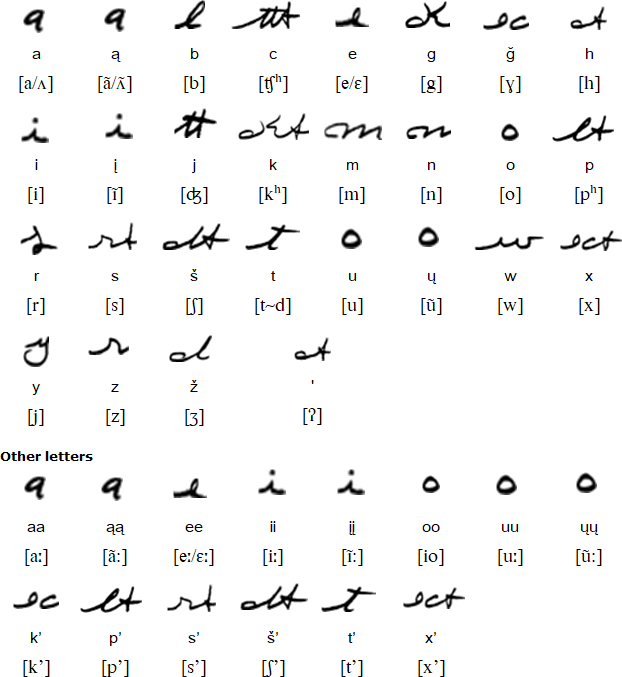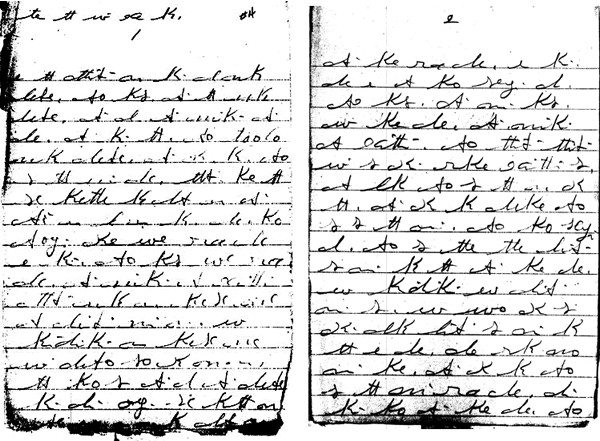The Hočąk Syllabary used to be used write Ho-Chunk, a Siouan language spoken in Wisconsin, Nebraska and Iowa in the USA. It was adapted from the Fox syllabary, which was invented in the 1870s and is based on the Latin alphabet.

Ho-Chunk is now written with the Latin alphabet.
Download alphabet charts for Ho-Chunk (Excel)

Éja činąkižą nąkše. Hųgᵋra hija nąkše. Hižą́ hįnį́k hiže. Hagiją hot’ųpnąkše. Hįkagá howarajanįže. Čągéja rekjega šana hihinąpanąga žegų hoikewes’aže. Égi hųgᵋra wes’aže, "Hįnį́k háxjį e činąkokanągᵋwira ne hišininą. Wąkšigᵋnạgᵋre ne wišurukąnąną. Jagúra hižą́ hišegiži, hoirekjanaheną," ánąkšaną, hįges’aže. Égi žee hagoreižą, hųgᵋra hinįgᵋra wageže, "Hįnį́k háxjį hočįčįwira gisgexjįra hąpga horajanagają, hįkagá šge horarajanį; hagoreižą, horajeje pįranigáją," higéže. Wąkšik wašinira wawokarakišgą pįranigáją," éže. Žésganųnįgé hįkagá horajanįs’aže. Žigígų higéže. Horajá šiže. Jagú anihega, žesge žigigeže,
There a village was. The chief was there and he had a son. He kept him in a partition and he never went around. Only, when he would do one of nature's duties would he go out and he would return right away. The chief would say, my son, this village is yours. The people are under your charge. Whatever you say, they will do it, he would say to him. Then one day the chief said to his son, my son, all young men of your size are going about but you never go around. Some times it would be good to go about, he said to him. You ought to associate with your people he told him, but still he would never visit around, again he said it to him.
Source: https://hotcakencyclopedia.com/ho.HTS.OceanDuck.html
Information about the Ho-Chunk language | Hočąk Syllabary | Numbers | Tower of Babel
Information about the Hočąk Syllabary
https://hotcakencyclopedia.com/ho.Pronunciation.html
Ahom, Aima, Arleng, Badagu, Badlit, Basahan, Balinese, Balti-A, Balti-B, Batak, Baybayin, Bengali, Bhaiksuki, Bhujimol, Bilang-bilang, Bima, Blackfoot, Brahmi, Buhid, Burmese, Carrier, Chakma, Cham, Cree, Dehong Dai, Devanagari, Dham Lipi, Dhankari / Sirmauri, Ditema, Dives Akuru, Dogra, Ethiopic, Evēla Akuru, Fox, Fraser, Gond, Goykanadi, Grantha, Gujarati, Gunjala Gondi, Gupta, Gurmukhi, Halbi Lipi, Hanifi, Hanuno'o, Hočąk, Ibalnan, Incung, Inuktitut, Jaunsari Takri, Javanese, Kaithi, Kadamba, Kamarupi, Kannada, Kawi, Kharosthi, Khema, Khe Prih, Khmer, Khojki, Khudabadi, Kirat Rai, Kōchi, Kodava Lipi, Komering, Kulitan, Kurukh Banna, Lampung, Lanna, Lao, Lepcha, Limbu, Lontara/Makasar, Lota Ende, Magar Akkha, Mahajani, Malayalam, Meitei (Modern), Manpuri (Old), Marchen, Meetei Yelhou Mayek, Meroïtic, Masarm Gondi, Modi, Mon, Mongolian Horizontal Square Script, Multani, Nandinagari, Newa, New Tai Lue, Ojibwe, Odia, Ogan, Pahawh Hmong, Pallava, Phags-pa, Purva Licchavi, Qiang / Rma, Ranjana, Rejang (Kaganga), Sasak, Savara, Satera Jontal, Shan, Sharda, Sheek Bakrii Saphaloo, Siddham, Sinhala, Sorang Sompeng, Sourashtra, Soyombo, Sukhothai, Sundanese, Syloti Nagri, Tagbanwa, Tai Noi, Takri, Tamil, Tanchangya (Ka-Pat), Tani, Thaana, Telugu, Thai, Tibetan, Tigalari, Tikamuli, Tocharian, Tolong Siki, Vatteluttu, Warang Citi
Page last modified: 16.03.23
[top]
You can support this site by Buying Me A Coffee, and if you like what you see on this page, you can use the buttons below to share it with people you know.

If you like this site and find it useful, you can support it by making a donation via PayPal or Patreon, or by contributing in other ways. Omniglot is how I make my living.
Note: all links on this site to Amazon.com, Amazon.co.uk
and Amazon.fr
are affiliate links. This means I earn a commission if you click on any of them and buy something. So by clicking on these links you can help to support this site.
[top]